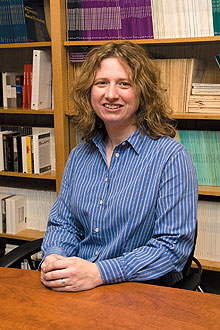  |
| HOME | THIS ISSUE | CALENDAR | PATENTS | BACK ISSUES | < BACK | NEXT > |
Study shows 'ripple effect' of weight loss programs among couples by Colin Poitras - November 10, 2008 | ||||
| Behavioral psychologist Amy Gorin has good news for married couples trying to maintain a healthy weight. Gorin is the lead author of a study published in the International Journal of Obesity that shows there is a definite “ripple effect” among spouses when one marital partner takes part in a behaviorally-based weight loss program. While much has been published regarding the tendency of couples to gain weight together after marriage, Gorin’s research looked at the potential positive side of cohabitation when it comes to weight loss. Gorin’s study, published in the journal’s September issue, found that couples tend to lose weight together too — even if only one person actually goes on a structured diet. Lifestyle changes Researchers specifically studied whether the spouses of overweight individuals with type 2 diabetes who were enrolled in an intensive weight loss program lost more weight and made more healthy changes in their lifestyle than the spouses of people with type 2 diabetes assigned to a control group. Spouses of individuals enrolled in the more intense program lost an average of five pounds, even though they did not participate in the weight loss program themselves. In some cases, the ripple effect was even more pronounced. In one case, a husband lost 35 pounds through the intense lifestyle intervention while his untreated wife lost 14 pounds. In another, a woman in the intense dieting program lost 19 pounds and her untreated husband lost 19 pounds also. In a third case, a woman lost 9 pounds while her untreated husband lost 6. “To the best of our knowledge this study is the first to document that behavioral weight loss treatment delivered to one spouse has a clinically significant impact on the weight of the untreated spouse,” says Gorin, an assistant professor of psychology in the College of Liberal Arts and Sciences who specializes in weight control strategies, motivational techniques, and social influences regarding weight loss. Over the course of a year, the spouses of participants in the more intensive weight loss program lost, on average, nearly 3 percent of their body weight compared to losses of less than 0.25 percent by the spouses of those participants in the less intense program.
Gorin believes the ripple effect may be due to untreated spouses emulating their partners’ healthier behavior by joining them in doing such things as counting calories, weighing themselves more often, and eating lower-fat foods. “When we change our eating and exercise habits, it can spill over in a positive way to other people,” Gorin says. “This is evidence that if you change your own behavior, you may motivate others around you and get them motivated as well.” Buying food online In a separate study released last fall, she found that some people trying to lose weight may also benefit from buying their groceries online and taking advantage of home delivery services such as Peapod.com. The 2007 study, published in the International Journal of Behavioral Nutrition and Physical Activity, showed that individuals on weight loss plans who purchased their groceries from the online service Peapod.com bought 28 percent fewer high-fat foods than those who purchased items at their local supermarket. “Making food choices online helps people avoid the temptations of high-fat impulse purchases in their local grocery store,” says Gorin, the study’s lead author. “Many online grocery shopping sites also help consumers make healthier food choices by allowing them to sort their purchases by calorie and fat content,” she says. Gorin recently received financial support from CHIP to create an obesity research interest group in Storrs, with the goal of fostering interdisciplinary research on the topic at Storrs campus and with researchers from the UConn Health Center in Farmington. |
| ADVANCE HOME UCONN HOME |

